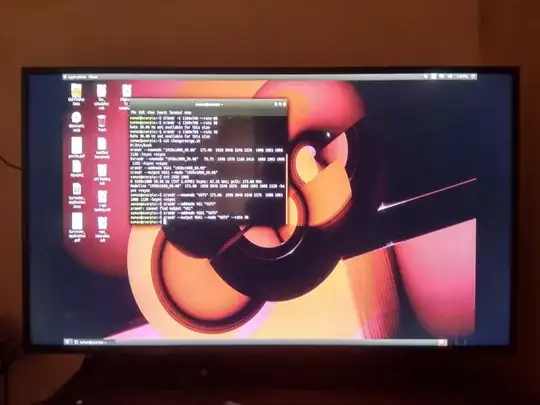I have a Ubuntu 18.04 LTS desktop with Intel integrated graphics (Ivybridge) which I have connected to my Android TV using a VGA to HDMI adaptor (VGA from desktop to HDMI in TV). I am using Gnome flashback (metacity) desktop as I have another issue with the Ubuntu desktop which is posted here - Distorted graphics in Ubuntu 18.04 with intel integrated graphics. Ubuntu is unable to detect the highest resolution (1920x1080) automatically and these are the default modes listed by xrandr.
$ xrandr -q
Screen 0: minimum 8 x 8, current 1024 x 768, maximum 32767 x 32767
VGA1 connected primary 1024x768+0+0 (normal left inverted right x axis y axis) 0mm x 0mm
1024x768 60.00*
800x600 60.32 56.25
848x480 60.00
640x480 59.94
VIRTUAL1 disconnected (normal left inverted right x axis y axis)
I have used xrandr to add the 1920x1080 mode and use it following the set of commands below
xrandr --newmode "1920x1080_60.00" 173.00 1920 2048 2248 2576 1080 1083 1088 1120 -hsync +vsync
xrandr --addmode VGA1 "1920x1080_60.00"
xrandr --output VGA1 --mode "1920x1080_60.00"
The arguments to the newmode are generated using "cvt" utility. While the resolution appears to be okay, the aspect ratio does not seem to be 16:9 and the desktop does not fill the whole display as shown in the attached picture below.
I have tried changing the refresh rate to the specified values of the TV manufacturer but without any success. I have also tried the different fitting option (Full, Unscaled, Wide, 16:9 etc.) provided in the TV's picture setting menu, which also doesn't help. I couldn't find this kind of issue anywhere. I'll truly appreciate any help in this regard.
Many thanks.
Here are some of the system info:
$glxinfo -B
name of display: :1.0
display: :1 screen: 0
direct rendering: Yes
Extended renderer info (GLX_MESA_query_renderer):
Vendor: Intel Open Source Technology Center (0x8086)
Device: Mesa DRI Intel(R) Ivybridge Desktop (0x152)
Version: 19.2.8
Accelerated: yes
Video memory: 1536MB
Unified memory: yes
Preferred profile: core (0x1)
Max core profile version: 4.2
Max compat profile version: 3.0
Max GLES1 profile version: 1.1
Max GLES[23] profile version: 3.0
OpenGL vendor string: Intel Open Source Technology Center
OpenGL renderer string: Mesa DRI Intel(R) Ivybridge Desktop
OpenGL core profile version string: 4.2 (Core Profile) Mesa 19.2.8
OpenGL core profile shading language version string: 4.20
OpenGL core profile context flags: (none)
OpenGL core profile profile mask: core profile
OpenGL version string: 3.0 Mesa 19.2.8
OpenGL shading language version string: 1.30
OpenGL context flags: (none)
OpenGL ES profile version string: OpenGL ES 3.0 Mesa 19.2.8
OpenGL ES profile shading language version string: OpenGL ES GLSL ES 3.00
$inxi -G
Graphics: Card: Intel Xeon E3-1200 v2/3rd Gen Core processor Graphics Controller
Display Server: x11 (X.Org 1.20.8 ) drivers: fbdev (unloaded: modesetting,vesa)
Resolution: 1920x1080@59.96hz
OpenGL: renderer: Mesa DRI Intel Ivybridge Desktop version: 4.2 Mesa 19.2.8
$lshw -c video
*-display
description: VGA compatible controller
product: Xeon E3-1200 v2/3rd Gen Core processor Graphics Controller
vendor: Intel Corporation
physical id: 2
bus info: pci@0000:00:02.0
version: 09
width: 64 bits
clock: 33MHz
capabilities: msi pm vga_controller bus_master cap_list rom
configuration: driver=i915 latency=0
resources: irq:28 memory:f7800000-f7bfffff memory:e0000000-efffffff ioport:f000(size=64) memory:c0000-dffff

$ xrandrshow as the default modes? – Holden Rohrer Jul 12 '20 at 19:39$ xrandr -q Screen 0: minimum 8 x 8, current 1024 x 768, maximum 32767 x 32767 VGA1 connected primary 1024x768+0+0 (normal left inverted right x axis y axis) 0mm x 0mm 1024x768 60.00* 800x600 60.32 56.25 848x480 60.00 640x480 59.94 VIRTUAL1 disconnected (normal left inverted right x axis y axis)– S Guha Jul 13 '20 at 09:27$ cvt -r 1920 1080The modeline generated using the above command has different parameters than those generated by only cvt. I can't explain why it worked. But I posted this solution in case if it helps others who have come across this kind of issue. Thanks to all. – S Guha Aug 07 '20 at 08:55video=VGA-1:1920x1080MR@60. – S Guha Aug 07 '20 at 09:00